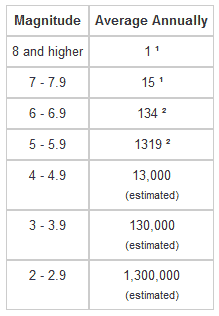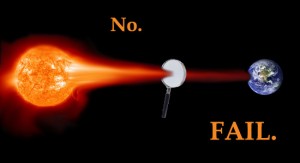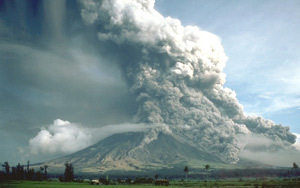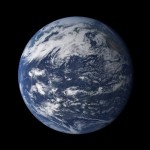The Earth is trembling.
A magnitude 5.9 earthquake hit Virginia on August 23 at 17:51 UTC. Twelve hours earlier, a magnitude 5.3 quake shook southern Colorado (I slept through it; it was 360 km away). On August 20, a magnitude 7.0 hit off the coast of eastern Australia, and another magnitude 7.0 earthquake took place in northern Peru on August 24 at 17:46 UTC, just a few hours ago as I write this.
What gives? Are we seeing a swarm of related events? Is the Earth shaking itself apart?
It’s easy enough to think so. But our brains are wired in a way that makes them easily fooled (proof). What we need to do is not panic – always a good start – and think this through. Happily, we have an exceptionally good tool for this sort of problem: science. Well, science and a tiny touch of math.
Get me some stats, stat!
 You need to look at the statistics, and not by coincidence the United States Geological Survey provides them. When you look at the chart, you see that there is 1 quake per year somewhere on Earth that’s magnitude 8 or more. There are 15 between 7.0 and 7.9 every year, or on average about one every three weeks. Mag 6? 134 per year, or 2-3 per week. Mag 5: 1300 per year, or about 4 per day.
You need to look at the statistics, and not by coincidence the United States Geological Survey provides them. When you look at the chart, you see that there is 1 quake per year somewhere on Earth that’s magnitude 8 or more. There are 15 between 7.0 and 7.9 every year, or on average about one every three weeks. Mag 6? 134 per year, or 2-3 per week. Mag 5: 1300 per year, or about 4 per day.
Right away, you can see that there are going to be decent-sized earthquakes somewhere on Earth all the time. And while on average you get mag 7 quake every few weeks, in reality the distribution is random. Getting two of them within a few days of each other is not only not surprising, statistically speaking it’s expected!
It’s unusual to get a quake centered in Virginia, but it’s not that odd. They’re rare for sure, but there was a bigger one in 1897. Colorado has had its share, too. Every state in the union has quakes; I remember one in Michigan when I was an undergrad at Ann Arbor. So in and of itself, having an earthquake anywhere in the US is not necessarily suspicious. Again, a chart on that USGS page shows that we should expect 50-70 mag 5 quakes a year in the U.S., so having two even on the same day is not all that unusual.
It came from outer space
So right away, the math is telling us that these quakes are probably not really clustered, and it’s a simple coincidence. Still, maybe it’s better to be sure. Could there be some other, unearthly cause?
 I’ve had a couple of emails and such asking if these earthquakes could be related to solar activity. The answer to that is: nope. First off, the Sun has been pretty quiet for the past couple of weeks, so that should be a tip-off that our nearest star isn’t to blame. Plus, Ian Musgrave at AstroBlog tried to correlate sunspots with earthquakes and came up empty. So the Sun isn’t to blame here.
I’ve had a couple of emails and such asking if these earthquakes could be related to solar activity. The answer to that is: nope. First off, the Sun has been pretty quiet for the past couple of weeks, so that should be a tip-off that our nearest star isn’t to blame. Plus, Ian Musgrave at AstroBlog tried to correlate sunspots with earthquakes and came up empty. So the Sun isn’t to blame here.
I know that there are conspiracy theorists out there trying to pin this kind of stuff on comets and things, but that’s just so much fertilizer as well. I debunked that idea years ago (and updated it here and here).
Interestingly, a writer at DailyKos tried to pin the Virginia quake on fracking – a method of extracting natural gas from underground repositories, so calm down, Battlestar fans – but a different writer at DailyKos put that idea down. It doesn’t sound plausible to me, to be honest, if only because, as I point out above, earthquakes in Virginia aren’t unknown. But as the second DK writer points out, the causation the first writer is trying to find probably isn’t there.
And somehow, I don’t think the east coast quake was caused by gay marriage. Or boobs.
Plait tectonics
What the science is telling me is pretty simple: what we have here is simply a restless planet coupled with our all-too-human nature of correlating events if they happen close in time or place. The latter isn’t surprising; it’s an evolutionary advantage to be able to pin an effect to a cause (“Hmmm, that rustle in the trees is probably a tiger. I’d better run.”). That ability can be fooled, and get us in trouble as it might in the case of the apparently-clustered earthquakes, but in general it’s better to be able to put the horse before the cart than otherwise.
 And having a restless planet is a consequence of having a habitable one. Earthquakes and other tectonic events are a major threat to humans, but they are the trade-off of having a thin crust floating on a magma ocean. We may owe our existence to that fact; volcanoes built up our continents and helped create our atmosphere, and the liquid inner bits of our planet are what generate our magnetic field that protects us from the solar wind. Mars doesn’t have that, and over a few billion years the Sun eroded away that planet’s atmosphere. Continental drift helped drive evolution (separating species and forcing them to adapt to new environments), and hey, here we are.
And having a restless planet is a consequence of having a habitable one. Earthquakes and other tectonic events are a major threat to humans, but they are the trade-off of having a thin crust floating on a magma ocean. We may owe our existence to that fact; volcanoes built up our continents and helped create our atmosphere, and the liquid inner bits of our planet are what generate our magnetic field that protects us from the solar wind. Mars doesn’t have that, and over a few billion years the Sun eroded away that planet’s atmosphere. Continental drift helped drive evolution (separating species and forcing them to adapt to new environments), and hey, here we are.
Trying to find some reason other than seismic activity for all this is natural, and as long as it’s done scientifically I have no problem with it. But I think in this case, it really all boils down to one simple thing:
Shift happens.
Related posts:
- Virginia earthquake waves ripple across the US
- No, the Supermoon didn’t cause the Japanese earthquake
- Do rainbow clouds foretell earthquakes
- Magnitude 8.8 earthquake off the Chile coast
- Repeat after me: asteroid TU24 is no danger to Earth
